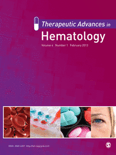
Therapeutic Advances in Hematology
Scope & Guideline
Transforming research into impactful therapies.
Introduction
Aims and Scopes
- Hematological Malignancies:
Research on various hematological malignancies, including acute myeloid leukemia (AML), multiple myeloma, and lymphomas, focusing on novel therapeutic strategies and clinical outcomes. - Transfusion Medicine and Hemostasis:
Exploration of topics related to transfusion practices, management of bleeding disorders, and advancements in therapies for hemophilia and thrombocytopenia. - Stem Cell Transplantation and Gene Therapy:
Studies addressing the role of hematopoietic stem cell transplantation (HSCT), including conditioning regimens, donor selection, and the integration of gene therapy in treating hematological diseases. - Patient-Reported Outcomes and Quality of Life:
Research that evaluates the impact of hematological diseases and their treatments on patients' quality of life, incorporating patient-reported outcomes to inform treatment decisions. - Innovative Treatment Modalities:
Investigation into new treatment modalities such as CAR-T therapy, bispecific antibodies, and targeted therapies, with a focus on their efficacy and safety in various hematological conditions.
Trending and Emerging
- Targeted and Personalized Therapies:
A growing emphasis on targeted therapies, such as B-cell maturation antigen (BCMA) targeting in multiple myeloma, reflects the shift towards personalized medicine tailored to individual genetic profiles. - Immunotherapy Advances:
The rise of immunotherapeutic strategies, including CAR-T cell therapy and bispecific antibodies, indicates a significant trend towards harnessing the immune system to combat hematological malignancies. - Real-World Evidence and Patient Experience:
Increased attention to real-world evidence and patient-reported outcomes highlights the importance of understanding treatment impacts from the patient's perspective, influencing clinical practice. - Innovations in Hematopoietic Stem Cell Transplantation:
Research focusing on advancements in HSCT techniques, including the use of haploidentical donors and novel conditioning regimens, is becoming more prominent as these methods improve patient outcomes. - Management of Rare Hematological Disorders:
There is an emerging focus on the management and treatment of rare hematological conditions, such as aplastic anemia and paroxysmal nocturnal hemoglobinuria, addressing unmet medical needs.
Declining or Waning
- Traditional Chemotherapy Approaches:
The focus on traditional chemotherapy regimens appears to be waning, as newer targeted therapies and immunotherapies gain prominence in treatment paradigms for hematological malignancies. - Historical Case Reports:
The journal has seen a decrease in the publication of historical or anecdotal case reports, as the emphasis shifts towards larger, evidence-based studies and clinical trials. - Generalized Treatment Guidelines:
There is less emphasis on broad treatment guidelines that do not consider individual patient characteristics, as precision medicine and personalized treatment strategies become more prevalent. - Epidemiological Studies:
Research focused solely on epidemiological data without direct clinical implications seems to be less prioritized, as the journal emphasizes studies that directly impact treatment outcomes and patient care.
Similar Journals

Hematologie
Advancing the Science of Blood DisordersHematologie is a highly regarded journal in the field of hematology, published by JOHN LIBBEY EUROTEXT LTD. With an ISSN of 1264-7527 and an E-ISSN of 1950-6368, this journal has established itself as a vital resource for researchers, clinicians, and students dedicated to advancing the understanding of blood disorders and treatments. Although the journal's coverage in Scopus was discontinued in 2018, it has continually provided invaluable insights and research findings. The journal aims to foster knowledge sharing and discussion in hematology, exploring innovative methodologies and emerging trends in the field. With a commitment to quality research, Hematologie remains an essential platform for disseminating critical findings that can drive clinical practice and influence future studies in hematological sciences.
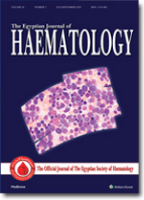
Egyptian Journal of Haematology
Empowering Hematologists with Cutting-Edge ResearchThe Egyptian Journal of Haematology, published by WOLTERS KLUWER MEDKNOW PUBLICATIONS, stands as a pivotal resource in the field of hematology, particularly within the context of Egypt and the broader Middle Eastern region. This journal is dedicated to disseminating high-quality research that explores the latest advancements in blood disorders, hematologic malignancies, and transfusion medicine. With a focus on original research, case studies, and reviews, it aims to provide a comprehensive platform for hematologists, researchers, and healthcare professionals to enhance their understanding and management of hematological conditions. Although it is not an open-access journal, the rigorous peer-review process ensures that only the most impactful studies are published, contributing to the journal's reputation in the academic community. The Egyptian Journal of Haematology serves as an essential tool for advancing knowledge, improving clinical outcomes, and fostering collaboration among experts in the field.
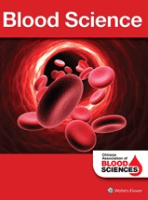
Blood Science
Enhancing Patient Care Through Scholarly InsightsBlood Science is a distinguished peer-reviewed journal published by Lippincott Williams & Wilkins, focusing on the dynamic field of hematology. Since its inception, the journal has aimed to disseminate high-quality research and innovative findings that contribute to our understanding of blood-related health issues. With the ISSN 2543-6368, it offers a platform for academic discussions and breakthroughs in various subfields including hematopathology, blood disorders, and transfusion medicine. As of 2023, Blood Science is ranked in the third quartile (Q3) within the hematology category, indicating a burgeoning influence among its peers, with a Scopus rank of #101 out of 137 journals, placing it in the 26th percentile. Although it is not an open-access journal, it provides essential insights and valuable data for researchers, healthcare professionals, and students alike, enhancing the collective knowledge and practices in hematology. With a publication period spanning from 2019 to 2024, Blood Science remains committed to fostering the advancement of blood science research and enhancing patient care methodologies.
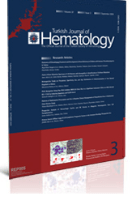
Turkish Journal of Hematology
Empowering the global hematology community through open access.Turkish Journal of Hematology is an esteemed publication dedicated to advancing the field of hematology, producing influential research since its inception in 1999 under the auspices of GALENOS PUBL HOUSE. With an Open Access model, it facilitates widespread dissemination of knowledge, allowing researchers, clinicians, and students to stay abreast of the latest developments in blood disorders and treatments. With an ISSN of 1300-7777 and an E-ISSN of 1308-5263, the journal holds a commendable position in the academic community, evidenced by its 2023 Q3 ranking within the hematology category and its standing at #80 out of 137 in the Scopus database, placing it in the 41st percentile. Covering a wide scope of topics within hematology, this journal serves as a critical resource for disseminating innovative research and clinical practices pertinent to the ongoing challenges faced in this vital area of medicine. With its continuous publication until 2024, Turkish Journal of Hematology remains a beacon for enhancing the understanding and treatment of hematological conditions within the Turkish and global medical communities.

Journal of Hematology & Oncology
Fostering Excellence in Hematology and Oncology ScholarshipJournal of Hematology & Oncology, published by BMC, is a leading open-access journal dedicated to the dynamic fields of hematology and oncology, with a continuous publication record since 2008. Based in the United Kingdom, this prestigious journal provides a platform for groundbreaking research, encompassing topics that span cancer research, hematological disorders, and molecular biology. With a remarkable Q1 ranking in multiple categories including Cancer Research, Hematology, Molecular Biology, and Oncology for 2023, it stands as a significant contributor to the scientific community. The journal's rigorous peer-review process ensures the dissemination of high-quality studies that drive advancements in these critical areas of medicine, boasting an impressive Scopus rank in the top echelons of its fields. As an open-access publication, it promotes widespread accessibility and sharing of knowledge, making it an indispensable resource for researchers, clinicians, and students striving to make advancements in understanding and treating hematological and oncological diseases.
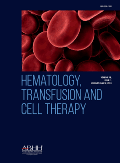
Hematology Transfusion and Cell Therapy
Transforming research into clinical practice.Hematology Transfusion and Cell Therapy, published by Elsevier, is a leading Open Access journal dedicated to advancing the fields of hematology, immunology, and transfusion medicine. Since its establishment in 2018, this journal has provided a vital platform for sharing innovative research and clinical advancements in the management of blood disorders and cellular therapies. Based in Brazil, it attracts a global audience, facilitating access to high-quality research that influences clinical practice and policy. With a current impact factor that places it in the Q3 category for both hematology and immunology as of 2023, the journal is recognized for its rigorous peer-review process and commitment to disseminating significant findings. By featuring a diverse range of articles, from original research to reviews, Hematology Transfusion and Cell Therapy aims to foster collaboration and knowledge sharing among researchers, professionals, and students alike, empowering them to tackle emerging challenges in their fields.
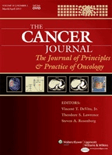
CANCER JOURNAL
Fostering Collaboration in the Fight Against Cancer.CANCER JOURNAL is a leading peer-reviewed publication dedicated to the dissemination of innovative research in the fields of cancer research and oncology. Published by Lippincott Williams & Wilkins, this journal serves as an essential resource for researchers, clinicians, and students seeking to advance their understanding of cancer mechanisms, treatment strategies, and patient care. With an ISSN of 1528-9117 and an E-ISSN of 1540-336X, it boasts a respectable 2023 Q2 category ranking in both Cancer Research and Oncology, reflecting its impactful contributions to the scientific community. Although it currently does not offer open access, the journal's rigorous peer-review process ensures the publication of high-quality, relevant studies that stimulate further investigation and collaboration among professionals. Since its inception, the journal has evolved through several converged years, maintaining a steadfast commitment to addressing the complexities of cancer biology and treatment. At its core, CANCER JOURNAL aims to foster advancements in oncology, making it a vital platform for sharing pivotal findings that could transform cancer research and therapeutic practices.

Indian Journal of Hematology and Blood Transfusion
Pioneering Research in Hematology for Tomorrow's HealthcareIndian Journal of Hematology and Blood Transfusion, published by SPRINGER INDIA, serves as a leading platform for disseminating original research, reviews, and case studies in the field of hematology. With an ISSN of 0971-4502 and E-ISSN 0974-0449, this journal has been instrumental in advancing knowledge from 2000 to 2024, providing insights into critical issues surrounding blood disorders and transfusion practices. Currently ranked in the Q3 category for Hematology for 2023, it reflects a commitment to high-quality scientific content amidst a competitive landscape where it ranks 97/137 in Scopus for Medicine - Hematology, placing it in the 29th percentile of its peers. The journal primarily addresses a diverse readership, including researchers, healthcare professionals, and students, aiming to foster innovation and collaboration within the field. Although it operates under a subscription model, access options for individual articles and institutional subscriptions ensure that valuable research is disseminated widely to enhance medical practice and education in hematology.
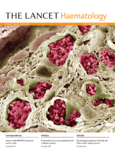
Lancet Haematology
Bridging clinical practice and pioneering research.Lancet Haematology, published by Elsevier Science Ltd in the United Kingdom, is a premier peer-reviewed journal dedicated to advancing the field of hematology. With an impressive impact factor and listed in the Q1 category in hematology for 2023, this journal ranks #4 out of 137 in the Scopus database, boasting a 97th percentile indicating its influential role in disseminating high-quality research. Since its establishment in 2014, Lancet Haematology has provided a vital platform for researchers and clinicians to share groundbreaking studies, innovative treatment approaches, and novel therapeutic discoveries relevant to various hematological disorders. The journal does not operate under an open access model, but it offers multiple access options to facilitate engagement with its content. By bridging clinical practice and cutting-edge research, Lancet Haematology aims to foster the advancement of knowledge and improve patient outcomes in hematology, making it an essential read for professionals, researchers, and students alike.

Experimental Hematology & Oncology
Transforming Research into Breakthroughs in Hematology & OncologyExperimental Hematology & Oncology is a premier journal published by BMC, dedicated to advancing knowledge in the fields of hematology, oncology, and cancer research. Since its inception in 2012, this Open Access journal has emerged as a vital resource for researchers and healthcare professionals, fostering the dissemination of high-quality research that enhances our understanding of blood disorders and malignancies. With impressive rankings in Quarters 1 of key categories including Cancer Research, Hematology, and Oncology, it holds significant prestige, evidenced by its Scopus rankings: #42/404 in Medicine (Oncology) and #17/137 in Medicine (Hematology). The journal aims to publish cutting-edge studies, reviews, and perspectives that contribute to the evolution of therapeutic strategies and innovative treatment modalities. Researchers and practitioners alike will find this journal indispensable for staying at the forefront of breakthroughs in hematological and oncological research.